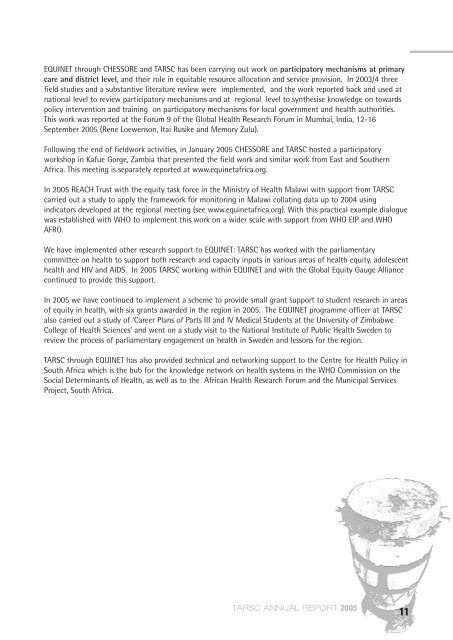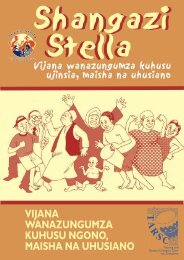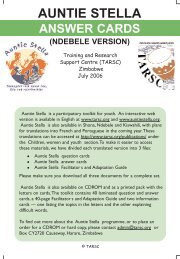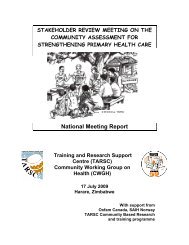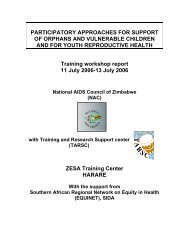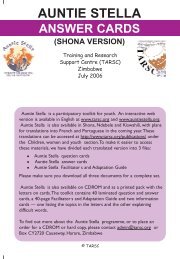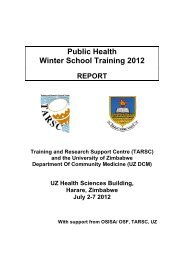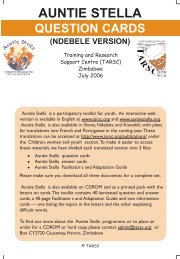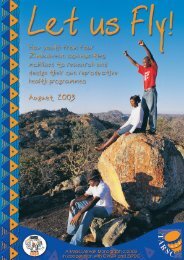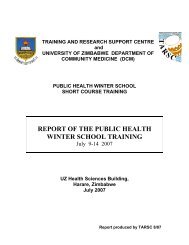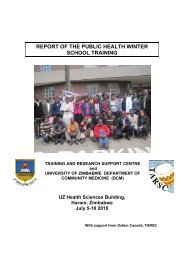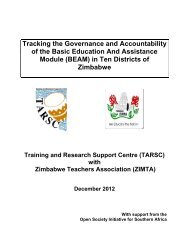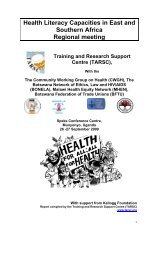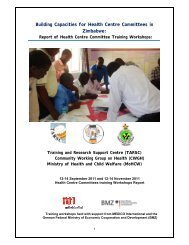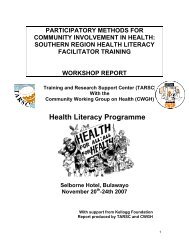TARSC Annual Report 2005 - Training and Research Support Centre
TARSC Annual Report 2005 - Training and Research Support Centre
TARSC Annual Report 2005 - Training and Research Support Centre
You also want an ePaper? Increase the reach of your titles
YUMPU automatically turns print PDFs into web optimized ePapers that Google loves.
EQUINET through CHESSORE <strong>and</strong> <strong>TARSC</strong> has been carrying out work on participatory mechanisms at primary<br />
care <strong>and</strong> district level, <strong>and</strong> their role in equitable resource allocation <strong>and</strong> service provision. In 2003/4 three<br />
field studies <strong>and</strong> a substantive literature review were implemented, <strong>and</strong> the work reported back <strong>and</strong> used at<br />
national level to review participatory mechanisms <strong>and</strong> at regional level to synthesise knowledge on towards<br />
policy intervention <strong>and</strong> training on participatory mechanisms for local government <strong>and</strong> health authorities.<br />
This work was reported at the Forum 9 of the Global Health <strong>Research</strong> Forum in Mumbai, India, 12-16<br />
September <strong>2005</strong> (Rene Loewenson, Itai Rusike <strong>and</strong> Memory Zulu).<br />
Following the end of fieldwork activities, in January <strong>2005</strong> CHESSORE <strong>and</strong> <strong>TARSC</strong> hosted a participatory<br />
workshop in Kafue Gorge, Zambia that presented the field work <strong>and</strong> similar work from East <strong>and</strong> Southern<br />
Africa. This meeting is separately reported at www.equinetafrica.org.<br />
In <strong>2005</strong> REACH Trust with the equity task force in the Ministry of Health Malawi with support from <strong>TARSC</strong><br />
carried out a study to apply the framework for monitoring in Malawi collating data up to 2004 using<br />
indicators developed at the regional meeting (see www.equinetafrica.org). With this practical example dialogue<br />
was established with WHO to implement this work on a wider scale with support from WHO EIP <strong>and</strong> WHO<br />
AFRO.<br />
We have implemented other research support to EQUINET: <strong>TARSC</strong> has worked with the parliamentary<br />
committee on health to support both research <strong>and</strong> capacity inputs in various areas of health equity, adolescent<br />
health <strong>and</strong> HIV <strong>and</strong> AIDS. In <strong>2005</strong> <strong>TARSC</strong> working within EQUINET <strong>and</strong> with the Global Equity Gauge Alliance<br />
continued to provide this support.<br />
In <strong>2005</strong> we have continued to implement a scheme to provide small grant support to student research in areas<br />
of equity in health, with six grants awarded in the region in <strong>2005</strong>. The EQUINET programme officer at <strong>TARSC</strong><br />
also carried out a study of ‘Career Plans of Parts III <strong>and</strong> IV Medical Students at the University of Zimbabwe<br />
College of Health Sciences’ <strong>and</strong> went on a study visit to the National Institute of Public Health Sweden to<br />
review the process of parliamentary engagement on health in Sweden <strong>and</strong> lessons for the region.<br />
<strong>TARSC</strong> through EQUINET has also provided technical <strong>and</strong> networking support to the <strong>Centre</strong> for Health Policy in<br />
South Africa which is the hub for the knowledge network on health systems in the WHO Commission on the<br />
Social Determinants of Health, as well as to the African Health <strong>Research</strong> Forum <strong>and</strong> the Municipal Services<br />
Project, South Africa.<br />
<strong>TARSC</strong> ANNUAL REPORT <strong>2005</strong><br />
11


